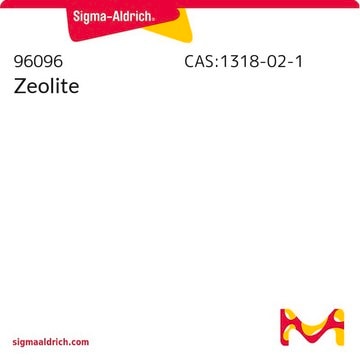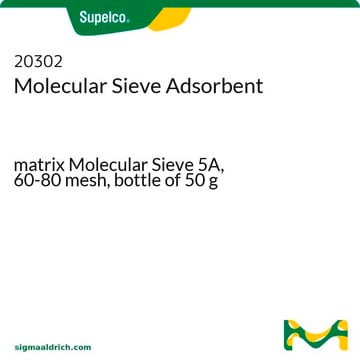MX1583L
Molecular Sieve, Type 4A
bead size 8-12 mesh
Synonym(s):
Molecular Sieve
Sign Into View Organizational & Contract Pricing
All Photos(1)
About This Item
UNSPSC Code:
23201100
Recommended Products
form
beads
Quality Level
bead size
8-12 mesh
color
tan
particle size
4-8 mesh (>=80%)
shipped in
ambient
storage temp.
room temp
General description
Molecular Sieve, Type 4A is an alkali metal aluminosilicate with a type 4A structure. It is used in the adsorption process to selectively adsorb molecules with an effective diameter <4Å and excludes molecules with an effective diameter >4Å.
Application
Molecular Sieve, Type 4A can be used:
- In regenerable drying systems to remove water vapor or contaminants.
- In drying saturated hydrocarbon streams and natural gas drying.
- To remove traces of water from various solvents (methanol, ethanol, acetone, DMSO, 1-butanol, 1-hexanol, and 1-octanol).
- In refrigerant drying.
Analysis Note
Color: Tan
Form: Beads
Identification (sodium): To pass test
Mesh size (8-12): 80% min
Form: Beads
Identification (sodium): To pass test
Mesh size (8-12): 80% min
Signal Word
Danger
Hazard Statements
Precautionary Statements
Hazard Classifications
Eye Dam. 1 - Skin Corr. 1B
Storage Class Code
8B - Non-combustible corrosive hazardous materials
WGK
WGK 1
Flash Point(F)
Not applicable
Flash Point(C)
Not applicable
Certificates of Analysis (COA)
Search for Certificates of Analysis (COA) by entering the products Lot/Batch Number. Lot and Batch Numbers can be found on a product’s label following the words ‘Lot’ or ‘Batch’.
Already Own This Product?
Find documentation for the products that you have recently purchased in the Document Library.
A study of the dehydration process of natural gas in Iraqi North Gas Company and the treatment methods of molecular sieve problems
Thesis (2012)
Study of intermolecular interaction in dimethylsulphoxide+ 1-alkanols (1-butanol, 1-hexanol, 1-octanol) at 303.15 K
Ali A, et al.
Physics and Chemistry of Liquids, 38(4), 459-473 (2000)
Electron microscopy of filamentous fungi
O?Connell RJ, et al.
Molecular and cell biology of filamentous fungi: a practical approach, 175-208 (2001)
Our team of scientists has experience in all areas of research including Life Science, Material Science, Chemical Synthesis, Chromatography, Analytical and many others.
Contact Technical Service







